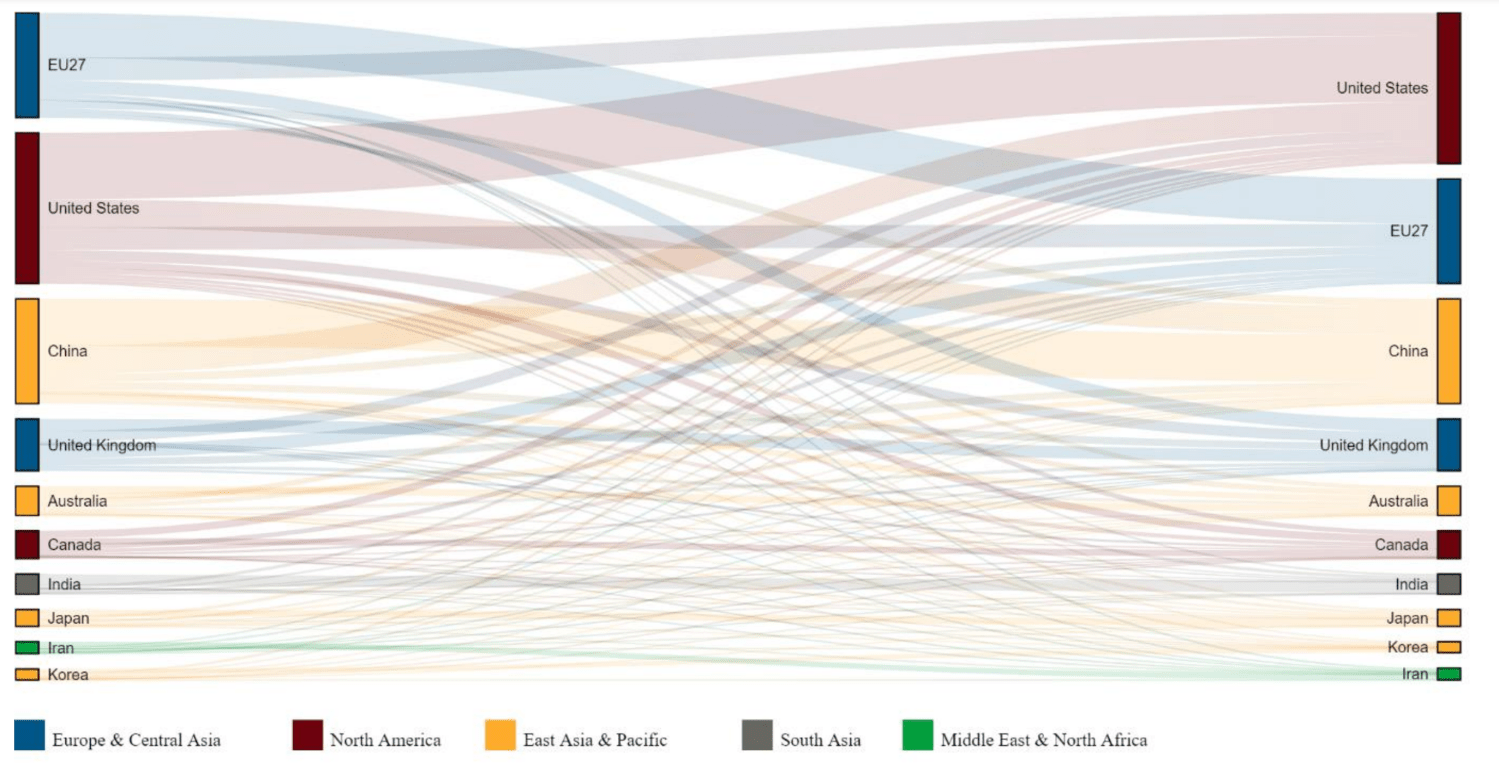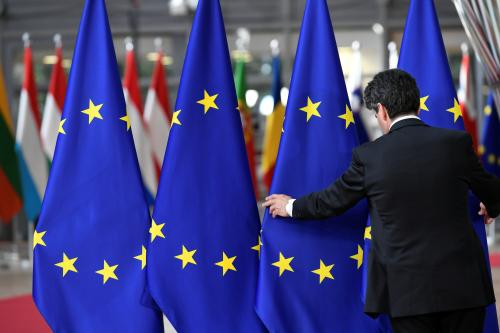In October, the Forum for Cooperation on Artificial Intelligence (FCAI), a multistakeholder dialogue among high-level government officials and experts from industry, civil society, and academia, released an interim report taking stock of the current landscape for international cooperation on AI and offering recommendations to make further progress.
FCAI publicly launched the report as part of Brookings’ Global Forum on Democracy and Technology event, Aligning technology governance with democratic values. UK Secretary of State Digital, Culture, Media and Sport, Nadine Dorries, praised the “excellent” report as a “helpful step in [the] process” of building international AI collaboration while discussing her government’s role in its presidency of the G7 group and its upcoming Future Tech Forum. To discuss the report, Brookings co-authors Cam Kerry and Josh Meltzer, and Andrea Renda of the Centre for European Policy Studies (CEPS) welcomed a panel featuring representatives from the governments of Australia, Canada, and the United States, as well as industry representatives from IBM and Twitter.
While the entire event and panel discussion around the report can be found here, for some unfamiliar with the FCAI, this blog will serve as an introduction to the Forum and the new report. Specifically, it will provide background on the creation of the FCAI and preview key elements of the report, including the arguments for international cooperation on AI, the current international AI policy landscape, and the list of proposed recommendations with which the FCAI intends to shape future dialogues on the issue.
What is the FCAI?
As the strategic, economic, and social significance of artificial intelligence has become widely recognized in recent years, governments, industry, and other international stakeholders have started to develop individual strategies to capitalize on opportunities and address challenges.
Since 2017, when Canada became the first country to adopt a national AI strategy, at least 60 countries have adopted policies in some form—declarations, frameworks, industry guidance, or principles—focused on artificial intelligence. Industry leaders in the tech sector have taken similar steps to codify their approaches to AI, working toward responsible, trustworthy, and ethical use and outcomes.
As these efforts across stakeholders became increasingly global—and their outputs increasingly robust – Brookings and the Center for European Policy Studies (CEPS) worked together on a deeper exploration of future harmonization mechanisms and established the FCAI in early 2020.
Over the past 18 months, the FCAI has held nine AI Dialogues, bringing together hundreds of participants for high-level, multistakeholder roundtables featuring government officials from the UK, U.S., EU, Canada, the UK, Japan, Australia, and Singapore, along with leading experts from academia, the private sector, and civil society. The FCAI report, Strengthening international cooperation on AI: A Progress Report, summarized below, is the culmination of the first eight of the nine roundtables.
Why international cooperation on AI is important
The report makes a strong case for international cooperation on AI. Grounded in the concrete realities of AI development, international trade, and democratic values, Section 1 of the text delineates both the negative consequences of an international landscape lacking in cooperation and the benefits of increased partnership. It also highlights potential positive impacts of AI to address global challenges like climate change or pandemic preparedness. The report argues that “no country can go it alone,” and demonstrates how powerfully a collaborative international framework could influence the positive trajectory of AI development and deployment. The necessity and benefits of a collaborative approach are exemplified by the increasingly global AI research-and-development landscape, proposing that cooperation across international teams has the potential to facilitate resource-intensive research and enable developers to upscale projects.

The international state-of-play
Section 2 of the report provides an overview of the state-of-play in countries currently participating in FCAI, detailing both domestic outputs such as AI strategies, industry guidance, and investment data, as well as concrete commitments to engagement on the international level. This section also charts the broader international terrain, demonstrating the wide range of international bodies (the 17-nation Global Partnership on AI and OECD, UNESCO, WTO, APEC), international standards organizations (ISO/IEC, IEEE, ITU-T), and non-governmental bodies (NYU’s AI Now Institute, the World Economic Forum, the private sector Partnership on AI) that contribute to the international discussion on AI.
Recommendations
Finally, the FCAI report presents fifteen specific recommendations for further developing international cooperation on AI. These recommendations fall into three broad categories: regulatory alignment, research and technology-driven standards development, and joint research and development. These broader categories are discussed below, highlighting key recommendations that undergird others and showcase the larger intent of each grouping.
The first ten recommendations of the report discuss improvements for regulatory alignment, and approach cooperation on AI as an incremental process where lighter forms of cooperation can compound over time and lead to more comprehensive practices. As a foundation, Recommendation 1 calls on governments to embed their commitments to cooperation on AI into their domestic strategies. Other recommendations in this category continue to lay groundwork for efficient communication and collaboration, such as agreeing on a common definition for AI, further aligning domestic frameworks of ethical principles, and establishing redlines in AI development to preserve democratic values and protect individual rights.
Recommendations 11 through 14 focus on developing the capacity for cooperation on AI standards in international standards bodies, such as ISO/IEC, IEEE, and ITU-T. Similar to the incremental approach proposed by the recommendations on regulatory alignment, recommendation 11 advocates for a “stepwise” approach that begins with foundational standards around definitions and terminology that can be applied in a horizontal, cross-cutting fashion, establishing a firm foundation on which new standards can be built as technologies mature.
The unique challenge of China, which is discussed throughout the report as both a foil in its techno-authoritarian approach to AI and as an inescapable partner for international collaboration, is also addressed concretely in the standards recommendations. Warning that international standards bodies should not become a proxy frontier for geopolitical competition, FCAI’s recommendation 13 calls for government participating in the forum to coordinate on international standards development in a way that encourages Chinese participation, but safeguards the industry-led, research-driven approach used by standards bodies. This approach prioritizes technical knowledge over political posturing.
In the final category, the single recommendation 15 calls for the development of common criteria and governance arrangements to facilitate international collaboration on large scale R&D projects. In addition to functioning as a vehicle for streamlining AI cooperation on challenges of global scale and significance, working on pressing issues where the outputs are public goods can operate as a high-incentive sandbox that allows governments and other stakeholders to find common ground while working in a collective environment.
Moving forward, FCAI intends to continue hosting dialogues, using this report and the recommendations within to delve deeper into ongoing conversations and approach new topics with a stronger foundation.
IBM is a general, unrestricted donor to the Brookings Institution. The findings, interpretations, and conclusions posted in this piece are solely those of the author and not influenced by any donation.
The Brookings Institution is committed to quality, independence, and impact.
We are supported by a diverse array of funders. In line with our values and policies, each Brookings publication represents the sole views of its author(s).







Commentary
Why international cooperation matters in the development of artificial intelligence strategies
November 30, 2021